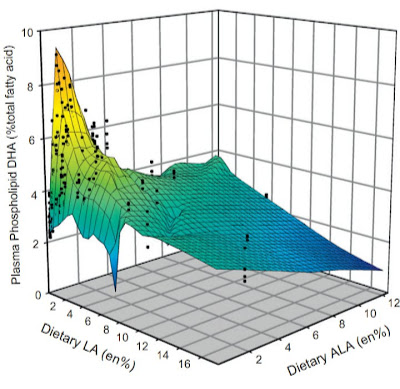Does more omega-3 really mean more health?
Ads for food supplements full of guaranteed healthy and necessary omega-3 fatty acids are pouring in on us from all sides. So it must be a well of health. But if you've read the previous posts, you probably know there's a catch. Studies on athletes using various dietary supplements have not shown any positive effect. Conversely, there is an increase in the concentration of toxic products such as aldehyde MDA or 4-HNE, which is certainly not good for strengthening health. But I have already written in another post that, for example, eating fish works, so why do supplements not work?
As always, it's a little more complicated. First we need to find out what we really want to improve. We only need a few polyunsaturated fatty acids (PUFAs) out of the many dozens possible. They are DHA, EPA and AA. In addition, we only need a small amount, just a little of a building material for membranes and signaling. We get them more or less finished from fish. Plants only provide semi-finished products that have yet to be processed in the complex chemical production lines of our body. However, these lines have limited capacity, and here is the problem. We must not overload them with the creation of useless products, because then they will not produce those useful products.
What does that mean specifically? The maximum concentration of DHA in the membranes is not achieved by increasing the consumption of omega-3 oils from plant sources, but on the contrary by omitting it. We don't have detailed controlled studies in humans, but we do have a nice study in laboratory rats. Take a look at this 3D chart.
It shows on the vertical axis the amount of DHA in the blood cell membranes depending on the different amounts of vegetable oils in the diet. The paradoxical dependence on it is clear, the more PUFAs, the less DHA. Optimal consumption of both omega-3 (ALA) and omega-6 (LA) is in the region of about 1% of total caloric intake. Paradoxically, any higher PUFA content in the diet reduces the DHA content. The same data in another graph, the more omega-6 linoleic acid (LA, bottom graph), the less DHA.
However, the more plant omega-3 (ALA) in the diet, the less DHA in the cell membranes. So you see, the result is clear. To give you an idea, today's average consumption of omega-6 is at a level approaching 10% of energy intake, ie the lower graph. With such a diet, we will never reach the required concentration of DHA from vegetable oils alone. It just doesn't work.
The production of DHA from ALA shares the same enzymes (machines) that are used to process omega-6 linoleic acid. There is no capacity left to process the ALA and it has been waiting in line for a long time. In the meantime, it degrades and degrades, turning into toxic substances and damaging. Therefore, it does not make sense to supplement omega-3 until you reduce your omega-6 intake. So start by completely eliminating vegetable oils from seeds, sunflower, rapeseed but also flax. Oils are not a good source or omega-3, because they are oxidized from the factory. This also applies to the already mentioned food supplements containing oils.
I would like to remind you again that supplementation of omega-3 in the form of DHA can bring very positive results. Unlike vegetable oils (LA, ALA), DHA contained in fish oil and meat will not be used for energy production. DHA is a building material and burning is prevented, it is due to the circular spatial arrangement, it is not easy to convert it into ATP energy. Therefore, it cannot damage the oxygen signaling in the cell and will not negatively affect fat burning. In contrast, vegetable oils, if there is an excess, will preferably be offered for burning. This, in the long term, disrupts the signaling of the presence of oxygen in the cell and reduces the overall fat burning with all the negative effects on the body, which usually manifests itself as known diseases of civilization.
References:
Effect of 6 Weeks of n-3 Fatty-Acid Supplementation on Oxidative Stress in Judo Athletes
Linoleic Acid: A Nutritional Quandary
Human trial with the same effect:






Comments
Post a Comment